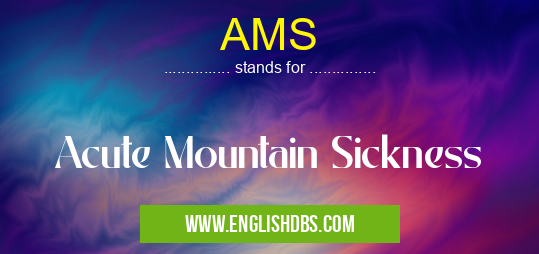What does AMS mean in DISEASES
AMS stands for Acute Mountain Sickness, which is a medical condition that can develop when a person rapidly ascends to high altitudes. It is also known as altitude sickness or soroche. AMS occurs due to the body's inability to adjust quickly enough to the decreasing oxygen levels at higher elevations.

AMS meaning in Diseases in Medical
AMS mostly used in an acronym Diseases in Category Medical that means Acute Mountain Sickness
Shorthand: AMS,
Full Form: Acute Mountain Sickness
For more information of "Acute Mountain Sickness", see the section below.
Symptoms of AMS
- Nausea
- Vomiting
- Headache
- Fatigue
- Dizziness
- Shortness of breath
- Loss of appetite
- Difficulty sleeping
Causes of AMS
- Rapid ascent to high altitudes
- Not allowing enough time for the body to acclimate to the altitude
- Certain medical conditions, such as heart or lung disease
- Genetics
Treatment for AMS
- Descending to a lower altitude
- Resting and avoiding strenuous activity
- Taking pain relievers, such as acetaminophen or ibuprofen
- Drinking plenty of fluids
- Eating a healthy diet
Prevention of AMS
- Ascending slowly to high altitudes
- Allowing for acclimatization time at each elevation
- Staying hydrated
- Eating a nutritious diet
- Avoiding alcohol and caffeine
- Taking medications to prevent AMS, such as acetazolamide
Essential Questions and Answers on Acute Mountain Sickness in "MEDICAL»DISEASES"
What is Acute Mountain Sickness (AMS)?
AMS is a medical condition that can occur at high altitudes, typically above 8,000 feet (2,400 meters). It is caused by the body's inability to adjust quickly to the lower levels of oxygen in the air. Symptoms include headache, nausea, vomiting, fatigue, and difficulty sleeping.
What are the symptoms of AMS?
The most common symptoms of AMS are headache, nausea, vomiting, fatigue, and difficulty sleeping. Other symptoms may include loss of appetite, dizziness, shortness of breath, and confusion.
Who is at risk for AMS?
Anyone who travels to high altitudes can be at risk for AMS, but some people are more susceptible than others. Factors that increase the risk of AMS include:
- Rapid ascent to high altitudes
- Spending a lot of time at high altitudes
- Having a history of AMS
- Being young or old
- Being overweight or obese
- Having certain medical conditions, such as heart or lung disease
How is AMS treated?
The best way to treat AMS is to descend to a lower altitude. Other treatments may include:
- Resting
- Drinking plenty of fluids
- Taking over-the-counter pain relievers, such as ibuprofen or acetaminophen
- Taking prescription medications, such as acetazolamide or dexamethasone
How can I prevent AMS?
There are several things you can do to prevent AMS, including:
- Ascending to high altitudes gradually
- Spending a few days at a lower altitude before ascending to a higher altitude
- Avoiding alcohol and caffeine
- Drinking plenty of fluids
- Eating a healthy diet
- Getting enough sleep
- Exercising regularly
Final Words: AMS is a common condition that can be experienced when ascending to high altitudes. By understanding the symptoms, causes, and prevention of AMS, individuals can minimize their risk of developing this condition and enjoy their time in the mountains.
AMS also stands for: |
|
| All stands for AMS |
